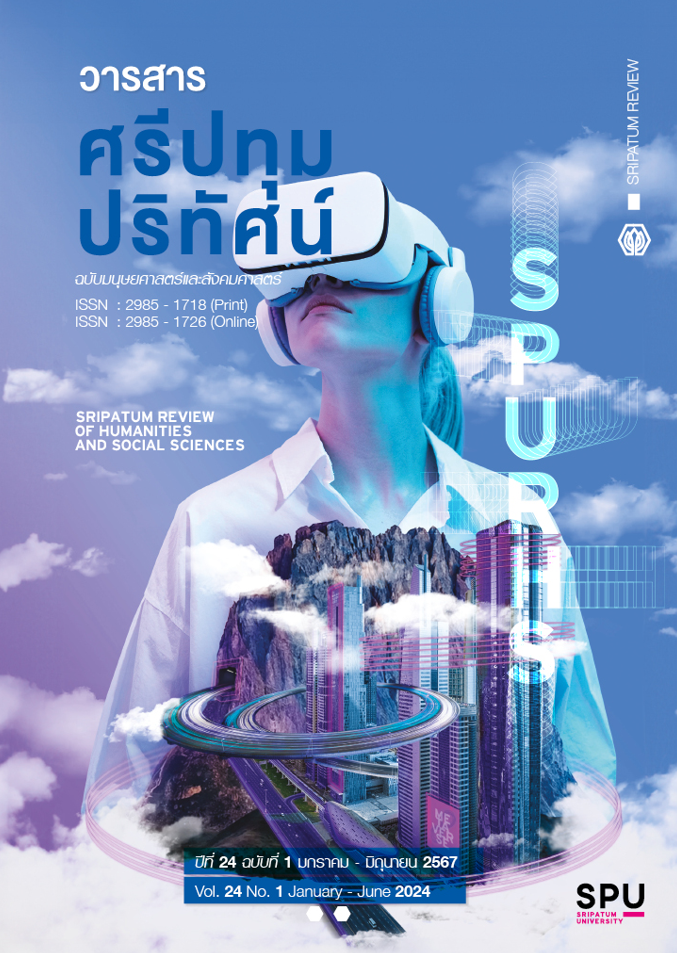The Confirmatory Factor Analysis of Digital Intelligence Skills for Students in Higher Education Institutions
Main Article Content
Abstract
The objective of this research the components of digital intelligence skills for students at higher education institutions. and to analyze the confirmatory components of digital intelligence skills for students of higher education institutions. The sample group is There are 10 experts. and 400 students from higher education institutions in the academic year 2022 were obtained by calculating the stratified random sampling method. The tools used in the research were a semi-structured interview form and a questionnaire on the components of digital intelligence skills. The reliability value is .962. Statistics used in data analysis include content analysis, mean, and standard deviation. Confirmatory factor analysis. The research results found that The component model of digital intelligence skills consists of 8 components: 1) Digital Identity (0.84) 2) Digital Use (0.90) 3) Digital Safety (0.92) 4) Digital Security (0.90) 5) Digital Emotional Intelligence (0.90) 6) Digital Communication (0.96) 7) Digital Literacy (0.95) and 8) Digital Right (0.91) There is statistical significance at the 0.01 level. The results of the confirmatory factor analysis of the digital intelligence skills model for students of higher education institutions created can be used to explain digital intelligence skills. and consistent with empirical data chi-square statistic () = 899.24, df = 895, p = 0.454, CFI = 1.00, AGFI = 0.90, RMSEA = 0.003
Article Details

This work is licensed under a Creative Commons Attribution-NonCommercial-NoDerivatives 4.0 International License.
1. กองบรรณาธิการสงวนสิทธิ์ในการพิจารณาและตัดสินการตีพิมพ์บทความในวารสาร
2. บทความทุกเรื่องจะได้รับการตรวจสอบทางวิชาการโดยผู้ทรงคุณวุฒิ แต่ข้อความและเนื้อหาในบทความที่ตีพิมพ์เป็นความรับผิดชอบของผู้เขียนแต่เพียงผู้เดียว มิใช่ความคิดเห็นและความรับผิดชอบของมหาวิทยาลัยศรีปทุม
3. การคัดลอกอ้างอิงต้องดำเนินการตามการปฏิบัติในหมู่นักวิชาการโดยทั่วไป และสอดคล้องกับกฎหมายที่เกี่ยวข้อง
References
Cronbach, L. J. (1970). Essentials of psychological testing. 3rd ed. New York: Harper& Row.
DQInstitute. (2017). Digital Intelligence. [Online]. Retrieved May 25, 2021, from: https://www.dqinstitute.org/what-is-dq
Hair, J. F., Black, W. C., Babin, B. J., & Anderson, R. E. (2010). Multivariate data analysis: A global perspective (7th ed.). New Jersey: Pearson Education Inc.
Krejcie, R.V., & Morgan, D.W., (1970). Determining Sample Size for Research Activities. Educational and Psychological Measurement, 30(3), 607-610.
Ministry of Information and Communication Technology. (2016). National Digital Economy and Society Development Plan and Policy. 1st ed. Bangkok: Ministry of Information and Communication Technology. (in Thai)
Park, Y. (2017). 8 digital life skill all children need - and a plan for teaching them. [Online]. Retrieved May 25, 2021, from: https://www.weforum.org/agenda/2016/06/8-digital-skills-we-must-teach-our-children/
Roopleam, T. (2017). Development of Digital Intelligence Quotient Program for Elementary School Students. Thesis of Master of Educational Research and Evaluation. Mahasarakham: Mahasarakham University. (in Thai)
Schumacker, R. E. & Lomax, R. G. (2010). A beginner’s guide to structural equation modeling (3rd ed.). New York: Taylor and Francis Group, LLC.
Thianthai, C. (2020). Effect of Online Social Media on Thai Social and Cultural Changes from an Anthropologist's Perspective. [Online]. Retrieved July 10, 2021, from: https://www.chula.ac.th/news/27969/ (in Thai)
Wannapiroon, P., & Wattananaiya, N. (2017). Digital Intelligence. Journal of Technical Education Development, 29(102), 12-20. (in Thai)
Wongsopha, A., Saiseesod, S., & Yanwaree, N. (2015). The Usage Behavior on Facebook Social Media Online and Their Effects on Students’ Life Style : A Case Study of Loei Rajabhat University. Research and Development Journal, Loei Rajabhat University, 10(33), 1-10. (in Thai)


